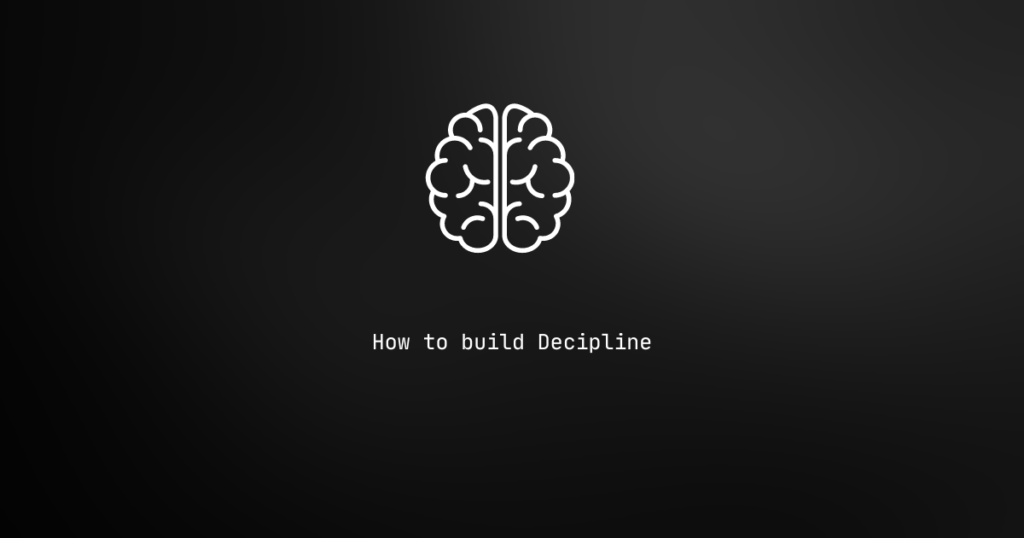why is self-discipline important?

what is discipline?
Discipline can be defined as the ability to control one’s actions, emotions, and behaviors to achieve desired outcomes. It involves staying committed to a course of action, even when faced with challenges or distractions. Discipline is about making consistent choices that align with your goals and values.
Why is discipline Important
Discipline serves as the bridge between goals and accomplishments. It provides the necessary framework for turning intentions into tangible results.
Without discipline, it’s easy to become sidetracked or discouraged, hindering progress and growth. Moreover, discipline fosters self-control and resilience, enabling individuals to overcome obstacles and persevere in the face of adversity.
Benefits of being disciplined
1)Achieving Goals:
Discipline is essential for setting and achieving goals. By maintaining focus and staying committed to the actions required for success, disciplined individuals can make steady progress toward their objectives.
Whether t’s advancing in a career, pursuing higher education, or improving personal relationships, discipline ensures that efforts are directed purposefully toward desired outcomes.
2)Improving Productivity:
Discipline is closely linked to productivity. By adhering to structured routines and prioritizing tasks effectively, disciplined individuals can maximize their efficiency and output.
Whether it’s completing work assignments, managing household chores, or pursuing hobbies, disciplined individuals make the most of their time and resources, leading to greater productivity and fulfillment.
3)Enhancing Mental Health:
Discipline contributes to mental well-being by promoting self-care and stress management. By establishing healthy habits such as regular exercise, adequate sleep, and mindfulness practices, disciplined individuals prioritize their physical and emotional health.
Additionally, discipline fosters resilience in the face of challenges, reducing feelings of anxiety and depression and promoting overall psychological resilience.
Factors Affecting Discipline
1)Motivation:
Motivation plays a significant role in maintaining discipline. When individuals are motivated by clear goals and intrinsic rewards, they are more likely to stay committed to their actions despite obstacles or setbacks.
Cultivating a sense of purpose and passion can fuel motivation and sustain discipline over the long term
2) Environment:

Surrounding oneself with supportive peers, conducive workspaces, and positive influences can enhance discipline by minimizing distractions and fostering accountability. Creating an environment that aligns with your goals and values can facilitate consistent behavior and reinforce disciplined habits.
3)Routine:
Establishing a structured routine is key to maintaining discipline. By scheduling specific times for tasks and activities, individuals can create a sense of order and predictability in their daily lives.
Consistent routines help minimize decision fatigue and procrastination, making it easier to stay focused and productive.
Tips to Improve Discipline
1)Set Clear Goals:
Start by setting clear, achievable goals that align with your values and aspirations. Break down larger goals into smaller, actionable steps, and establish deadlines to track progress. Clear goals provide a roadmap for success and serve as a source of motivation and accountability.
2) Create a Structured Routine:
Develop a daily or weekly routine that incorporates time for work, leisure, and self-care.
Prioritize tasks based on their importance and urgency, and allocate dedicated time blocks for focused work and relaxation. Stick to your routine consistently to build discipline and foster a sense of stability and balance in your life.
4)Stay Motivated:
Celebrate small victories, seek feedback and support from others, and visualize your goals regularly. Cultivate a growth mindset that embraces challenges and sees setbacks as opportunities for learning and growth
Overcoming Challenges
1)Dealing with Procrastination:
- Break tasks into smaller, manageable steps to alleviate overwhelm.
- Set specific deadlines and hold yourself accountable to them.
- Cultivate a habit of starting with just five minutes of focused work to overcome initial resistance
2)Handling Setbacks:
Setbacks are inevitable on the path to discipline and success. Instead of dwelling on failures or setbacks, focus on learning from them and adapting your approach accordingly.
Cultivate resilience by maintaining a positive attitude, seeking support from others, and staying committed to your long-term goals.
3)Practice Self-awareness
- Developing self-discipline starts with self-awareness.
- Take time to reflect on your strengths, weaknesses, and areas for improvement.
- Identify triggers and patterns that undermine your discipline, and develop strategies to overcome them effectively.
